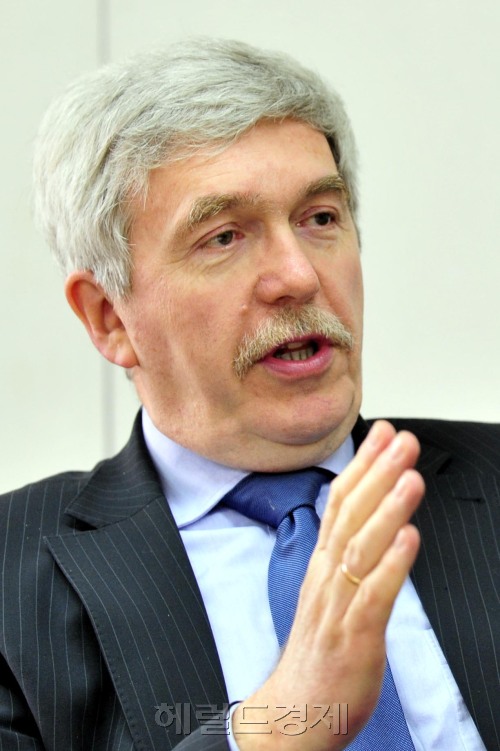CAMPUS Asia set to forge academic links in East Asia
Universities in Korea, China and Japan should trust one another and assure educational quality for a successful joint degree program, according to a European official in charge of student exchanges.
The three major East Asian countries launched a project titled “CAMPUS Asia” last week to enable their college students to earn joint degrees by credit transfer.
The project attempts to integrate the three neighbors in the sensitive field of education despite their historical conflicts and mixed national sentiment toward one another.
CAMPUS Asia is modeled after the European academic cooperation program Erasmus Mundus.
“We will give the opportunity to more than 200,000 students and teachers this year. Since the program started, more than 2.2 million students, teachers, and other university staff have been able to study in other member states,” said Jan Truszczynski, director-general for education and culture of the European Commission, told The Korea Herald.
Universities in Korea, China and Japan should trust one another and assure educational quality for a successful joint degree program, according to a European official in charge of student exchanges.
The three major East Asian countries launched a project titled “CAMPUS Asia” last week to enable their college students to earn joint degrees by credit transfer.
The project attempts to integrate the three neighbors in the sensitive field of education despite their historical conflicts and mixed national sentiment toward one another.
CAMPUS Asia is modeled after the European academic cooperation program Erasmus Mundus.
“We will give the opportunity to more than 200,000 students and teachers this year. Since the program started, more than 2.2 million students, teachers, and other university staff have been able to study in other member states,” said Jan Truszczynski, director-general for education and culture of the European Commission, told The Korea Herald.

As a director of Erasmus Mundus, Truszczynski visited Korea to pass on the know-how of the 25-year-old Erasmus program at the first international conference of the CAMPUS Asia program last Monday.
Starting with just 3,000 students in student exchange programs in 1987, the Erasmus program has enabled the most crucial part in European integration ― human mobility ― on the university level and in job markets. About 4,000 higher education institutions from 33 countries in the region participate in the program.
Truszczynski stressed quality assurance was key for success in its initial stage of academic cooperation among multiple countries.
He said participants must agree on quality and quantity of teaching and curriculum so that they can expect their students to obtain a certain level of qualification through the academic exchange program.
“There should be a minimum level of trust between universities. In other words, a sending university must believe the partner university is good enough and comparable academically.”
“It’s cooperation based on trust. If I don’t trust you, then the system doesn’t work.”
Erasmus focuses on keeping academic standards comparable throughout the region as mandated in the Bologna Process intended to create a European Higher Education Area.
“We are working on multi-dimensional tools that account for different performances and dimensions of universities to better compare,” he said.
The first bar to clear for successful student exchanges is the language barrier.
“It’s difficult to recruit students who are not fluent in other languages. So it’s better to offer curriculum in English,” he said.
“The more international you want to be, you have to have more access to English language courses.”
CAMPUS Asia has 10 consortia, each consortium made up of three universities, one each from Korea, China and Japan. It covers wide-ranging disciplines including public policy, science, business and culture. About 300 students are expected to participate in CAMPUS Asia this year.
Experts note that CAMPUS Asia shows the excellence of Korean universities in light of internationalization. They hope the number of students Korea sends to other countries will be balanced with that of the students it receives.
According to data by the Education Ministry, the number of foreign students studying in Korea in 2011 was 89,537, while there were 289,288 Korean students studying abroad.
“CAMPUS Asia will ensures participating universities have certain globally respected qualities and swap equal numbers of students,” said Moon Woo-sik, a professor at Seoul National University, who led the launch of the CAMPUS Asia program.
Korea has also participated actively in academic exchange programs with the Europe and other places, and gained a reputation as one of the most desired partners of academic cooperation in Asia, Moon said.
One thing that backs his view is that Korea has won the title “equal partnership” in Europe four years ago, joining the league of the U.S., Canada, Australia and Japan, with which the EU runs academic cooperation programs outside of its region.
“Korea is decidedly one of the countries that can do better and score higher in the overall league of exchange programs. It brings me to Korea to raise additional awareness of the benefits of the participation in the European Union programs,” Truszczynski said.
The Polish native has served the European Commission as director-general for education and culture since 2010. He was secretary of state at the Ministry of Foreign Affairs in Poland in 2005.
By Lee Woo-young (wylee@heraldcorp.com)


















